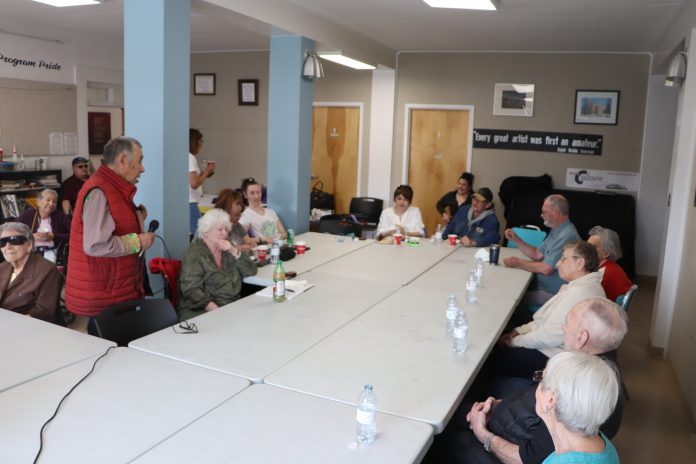
It was a day full of learning at the Margo Fournier Arts Centre in Prince Albert.
The Canadian National Institute for the Blind (CNIB) hosted a mobile hub on Tuesday providing services and workshops to the blind and low vision community of Prince Albert.
Amanda Titman is the team lead for advocacy and programs for CNIB in Saskatchewan. She says the mobile hub can be a game changer in helping people with visual disabilities to live a normal life.
“For most people in the community who have low vision or who are blind or deafblind, it is life-changing. (It’s) providing them the independence to be around people who truly understand what it is to live in a community like Prince Albert, whether it’s successes or barriers and really just feel like you’re part of the community in a complete sense.
While the service is welcome, Titman said getting the word out about it can be difficult. She says it’s one of the barriers for the organization.
“Our database is only so big. We know with the population of Prince Albert that there is likely more (than) 2,000 people right here in the community and surrounding area that are looking for the support but they don’t know it’s right here and so anytime we can get out in the community and provide the support is so incredibly important to us as an organization.”
One participant in attendance for the CNIB mobile hub was Don Horncastle. Horncastle is an advocate for the blind and low vision community in Prince Albert and helps run a monthly peer support group.
Horncastle says the mobile hub is important to build a sense of belonging.
“It really helps build community amongst blind and low vision people because quite often we’re isolated because of our disability. You can’t just get out of the house and go for a drive. This allows us to get together. It also allows us to share our shared life experiences, our successes, our failures and ways of compensating.”
Throughout the day, programming including technology courses showing attendees how to set up a smart phone and other devices with accessibility features, round table discussion about the challenges faced, the introduction of the Vision Mate program and Indigenous storytelling.
Titman says the attendance was beyond what CNIB had expected leading up to the event.
“We anticipated about 25 to 30 people at most. We know people and things happen after you’ve registered. Sometimes people don’t show up. Today’s a lot different though. We’re seeing actually more people than even if we lost a few people who have registered, we have well over 30 people in attendance and are just thriving to learn more.”
“We’re learning about CNIB programs.” Horncastle adds. “We’re putting forward issues that are of concern to us. CNIB has always maintained a strong advocacy role for those people who are blind. I think the main thing is they’re giving information to us about services they provide, articles that are available through their blind store, where we can buy canes, we can buy tools that help us live day to day as well as programs that help us live within the community.”
One discussion point at the mobile hub was the symbol of the white cane. Horncastle says not only is it a symbol for the deaf and low vision community, but it also provides practical use.
“The white cane is a tool for blind people to use to identify themselves, but also for mobility, to move around and not bang into chairs or posts or parking meters and feel the texture of the ground underneath us to make sure we’re not stepping in a rut or that kind of thing. When we try to cross the street, it should identify us to drivers that I don’t see you when I step off the curve, you’ve got to see me. It’s a mobility tool (and) a lot of people use it. You may have seen people that are blind who are tapping their way because they’re using it kind of (like) echolocation as well as the feeling.”
A monthly peer support group for the blind, low vision and deafblind community is hosted at the Margo Fournier Arts Centre the fourth Wednesday of every month from 1-3 p.m.
editorial@paherald.sk.ca

